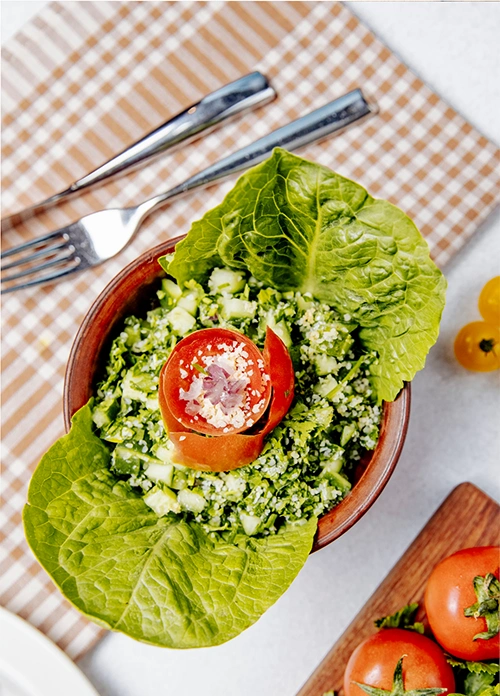

Top Health Benefits of Lebanese Tabbouleh Salad You Need to Know
Traditional Lebanese Tabbouleh Salad is a powerhouse of fresh, plant-based nutrition. Packed with vibrant parsley, this salad offers a rich source of vitamin K, vitamin C, folate, and antioxidants, which support immune function, bone health, and detoxification. The inclusion of bulgur wheat adds fiber and slow-digesting carbohydrates, helping with satiety and digestive health. Tomatoes and cucumbers contribute hydration, vitamins A and C, and anti-inflammatory compounds, while the lemon juice adds a refreshing dose of vitamin C and enhances mineral absorption. Olive oil, a staple of the Mediterranean diet, is loaded with heart-healthy monounsaturated fats and anti-inflammatory polyphenols. Together, these ingredients create a nutrient-dense dish that is light yet satisfying, hydrating, and ideal for boosting overall wellness while keeping calorie intake modest.
Recipe :
For 4 people
Enjoy your refreshing and healthy Traditional Lebanese Tabbouleh!
To achieve the perfect Tabbouleh, attention to texture, chopping precision, and ingredient balance is essential. Finely chopping the parsley is crucial—not only for authentic texture but to prevent the salad from becoming overly leafy or bitter. Bulgur should be soaked, not boiled, to maintain a delicate and fluffy texture that doesn’t overwhelm the greens. Make sure the bulgur is well-drained and cooled before mixing, or it may make the salad soggy. Tomatoes and cucumbers should be diced small and evenly to distribute flavor and moisture. When preparing the dressing, use freshly squeezed lemon juice and good-quality extra virgin olive oil for the best flavor. It's also recommended to chill the Tabbouleh for at least 30 minutes before serving to allow the flavors to meld together. Avoid adding salt too early, as it may draw moisture from the vegetables and affect the salad’s texture.

Tabbouleh is an excellent option for those following a Mediterranean, vegan, vegetarian, DASH, or low-calorie diet due to its whole food ingredients and emphasis on fresh vegetables and healthy fats. However, it is not suitable for ketogenic or paleo diets in its traditional form because bulgur is a grain high in carbohydrates. It’s also not gluten-free, as bulgur is made from wheat, so individuals with celiac disease or gluten sensitivity should avoid it unless a gluten-free substitute like quinoa is used. Likewise, this salad is not high in protein, so it may not meet the nutritional needs of those on a high-protein diet unless served alongside a protein-rich dish. While it can be incorporated into certain intermittent fasting protocols, it’s best consumed during eating windows due to its carbohydrate content. With simple modifications, though, such as replacing bulgur with cauliflower rice or quinoa, Tabbouleh can be adapted to meet a wider range of dietary needs.
...